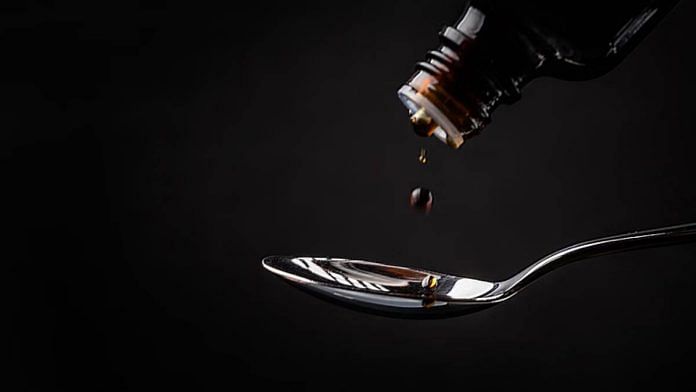New Delhi: India’s apex drug regulator, the Central Drugs Standard Control Organisation (CDSCO), last month instructed drugmakers not to sell a popular fixed dose combination (FDC) medicine, indicated as a cough syrup, for kids under the age of four.
While the 18 December notice mentioned the combination of chlorpheniramine maleate and phenylephrine hydrochloride, other FDCs marketed as cold and cough remedies for children are also under review by the CDSCO, ThePrint has learnt.
FDC drugs are those that contain a combination of two or more active pharmaceutical ingredients (APIs) in a single form, which is usually manufactured in a fixed proportion.
In its December order, the CDSCO had said that “concerns have been raised regarding promotion of unapproved anti-cold drug formulation for infants”.
The combination of chlorpheniramine maleate and phenylephrine hydrochloride was earlier declared to be a “rational FDC” in 2015 by an expert committee set up to identify rational and irrational FDCs.
The CDSCO notice said that the matter of unapproved anti-cold drug formulations for infants was deliberated upon in the organisation’s subject expert committee (SEC-pulmonary) meeting and it recommended that the FDC (chlorpheniramine maleate + phenylephrine hydrochloride) should not be used in children below four years of age.
“Accordingly, the firms should mention warnings in this regard on label and package insert,” it stated.
The combination of chlorpheniramine maleate and phenylephrine hydrochloride is widely used in cold and cough syrups.
A senior CDSCO official told ThePrint that in parallel, the SEC has decided to bring in paediatricians to review other permitted FDCs and in December, an application by generic drugmaker Akums Drugs & Pharmaceuticals to launch oral drops containing levosalbutamol, ambroxol hydrochloride and guaiphenesin was referred to a panel of paediatricians.
ThePrint has a copy of the minutes of the SEC meeting in which it referred the application to the panel.
“This FDC, too, is in the list of permitted drug combinations but the committee wants to review whether it may be appropriate to allow this for small children,” the official said.
ThePrint reached out to Rajeev Singh Raghuvanshi, the drugs controller general of India (DCGI), who heads the CDSCO, with queries over the telephone, but received no response. An email query sent to Akums seeking its response on the development involving its application also remained unanswered.
This report will be updated if and when replies are received.
Raising caution
Officials in the CDSCO maintained that going ahead, the regulator has decided to take a cautious approach in allowing FDCs, especially those meant as cold and cough syrups.
In an advisory issued on 5 December, the DCGI had said that in order to ensure quality, safety and efficacy of drugs formulation, it was of paramount importance that formulations are manufactured in compliance with the prescribed standards not only in respect of active pharmaceutical ingredients but also of various excipients used.
“In case of manufacture of cough syrups, various critical excipients like propylene glycol, glycerine, sorbitol etc, are used. The manufacturers are required to ensure that these excipients meet the regulatory standards of quality so as to avoid any contamination in the formulations manufactured by using such excipients,” the advisory had said.
As the use of cough syrups goes up in winters, the DCGI had advised manufacturers to purchase and use only pharma grade excipients from approved sources or vendors of quality standards.
This came in the wake of a number of episodes involving adulterated drugs, mainly cough syrups, by Indian drugmakers which were linked with adverse events, including deaths in several countries.
“That’s because of two reasons — there is a need to reanalyse the therapeutic benefit that FDCs offer and also concerns around the quality of excipients used in making cough syrups that have come under the scanner of late,” the senior CDSCO official said.
Concerns around FDC drugs, cough syrups
Several studies have shown that In India, FDCs of different drug classes and various strengths are widely available and not all of these are rational.
A study published in 2023 in the Journal of the Association of Physicians of India, undertaken by researchers from several top medical institutions, had pointed out that a commonly encountered FDC included cough and cold medications which were not always rational.
“Their over-the-counter sale is not strictly regulated,” it said.
“Several FDCs with Montelukast were encountered despite US Food and Drug Administration’s black box warning associated with it for serious mental health side-effects,” the authors stated.
“Although Montelukast in combination with antihistamines is approved only for rhinitis, chronic urticaria, atopy, allergy associated with asthma, and prevention of seasonal attacks of asthma; many a times these combinations are being prescribed in patients without any documented history of asthma, chronic urticaria, or rhinitis,” the researchers warned.
Some health experts agreed that many over-the-counter cough and cold syrups — mainly FDC drugs — in India and elsewhere were problematic.
“They often contain irrational combinations of two-three or even more drugs, with inaccurate doses for different age groups. Giving 5 ml of cough syrup meant for toddlers, for instance, can result in overdosing on some components while underdosing others,” Dr Poonam Sidana, director, neonatology & paediatrics at CK Birla Hospital in Delhi, told ThePrint.
Coughing is a protective reflex, clearing mucus and secretions from the airways and for young children, especially those aged under two, suppressing coughs — which some medicines do — can be harmful, she explained.
“Air pollution or viral infections will run their course, so cough and cold medicines often offer little benefit and may even be detrimental,” Sidana added.
(Edited by Nida Fatima Siddiqui)
Also Read: Coming soon: Accreditation norms for IVF clinics to ‘ensure quality service, best patient outcome’



